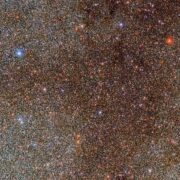These Rogue Worlds Upend the Theory of How Planets Form
Scientists have recently discovered scores of free-floating planets that defy classification—forcing them to rethink their theories of star and planet ..
Scientists have recently discovered scores of free-floating planets that defy classification—forcing them to rethink their theories of star and planet ..
In their jiggles and shakes, red giant stars encode a record of the magnetic fields near their cores. ..
The galaxy's stars keep a record of its history. By reading those stories, astronomers are learning more about how the Milky Way came to be—and about ..
New research from two teams shows that these fleeting blips can be faster and brighter, and come from much further away, than previously thought. ..
Scientists know enough about exoplanets to speculate about how simple plants might arise on them. But don't count on them being green. ..
A globe-spanning group of physicists used pulsars to measure the waves, which they believe emanated from pairs of supermassive black holes. ..
A new theory describes how particle interactions fuel fast magnetic reconnection, the process behind solar flares and other astrophysical jets. ..
A new technique could aid Hubble Space Telescope users, but the problem will get worse for observatories on Earth. ..

More than a decade of eyewitness data shows that fainter stars disappear as artificial light brightens the night sky. ..

The largest catalog ever collected by a single telescope maps Earth’s 3 billion stellar neighbors—and helps track the dust that warps how we see them. ..